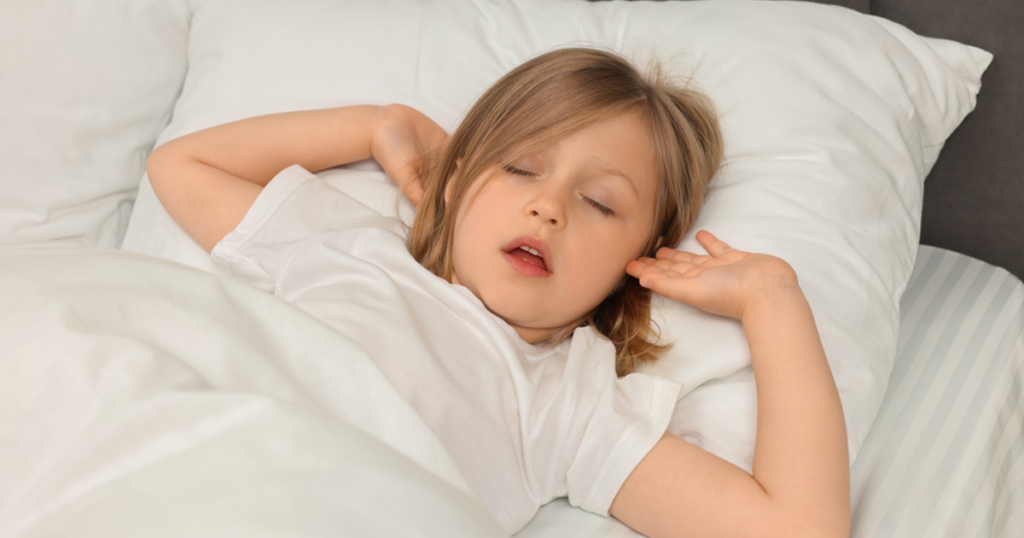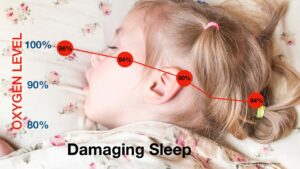Sleep disorders affect millions of people worldwide disrupting their nightly rest and, consequently, their overall health. One of the most common sleep disorders is sleep apnea, a condition characterized by pauses in breathing during sleep. Understanding this disorder is crucial for managing its symptoms and improving sleep quality. Here are six essential things to know about sleep apnea:
1. What is Sleep Apnea?
Sleep ‘Apnea is a sleep disorder that causes breathing to stop or become reduced during sleep, which can prevent the body from getting its VITAL required oxygen. Sleep Apnea is typically thought to be related to adults and NOT children. Sleep Apnea in young Infants and Children has direct affect on their ‘Brain Development’. In an Adult, the brain is thought to be completely developed at 20 years of age.
2. Symptoms of Sleep Apnea
Children and Infants with ‘Sleep Apnea’ can be discovered with an ‘At Home Sleep Test’. Early detection and treatment of ‘Sleep Apnea’ in Children and Adults is critical. The test may confirm common symptoms found in adults such as loud snoring, gasping or choking sounds during sleep, daytime fatigue, morning headaches, irritability, and difficulty concentrating.
In Infants & Children symptoms are not common or readily noticed and may never be discovered. The effect of Oxygen Deprivation may never be discovered or associated with the conditions that it causes. Many of these conditions are treated for other reasons and never associated with the being caused by the ‘Lack of Oxygen’ during sleep while they are Infants & Children.
3. Risk Factors
Numerous ‘Risk Factors’ occur in Adults such as obesity, male gender, aging, familial predisposition to the condition, smoking habits, nasal congestion, and various others. However in Children ’Risk Factors’ may be with natural causes.
It is said that 90% of all infants have a natural ‘Mouth Open Posture’ while Sleeping which reduces their Oxygen Intake by as much as 35%. If then an infant or child has ‘Sleep Apnea’ the potential harm of ‘Reduced Oxygen’ is even greater. This then creates a bigger impact on their Brain Development by reducing Oxygen Intake.
4. Consequences of Untreated Sleep Apnea
Untreated sleep apnea can have serious consequences on both brain development and mental health. Chronic sleep deprivation due to sleep apnea can lead to daytime drowsiness, impaired cognitive function, increased risk of accidents, high blood pressure, heart disease, stroke, and diabetes. It can also impact mood, causing irritability, depression, and decreased quality of life.
5. Diagnosis and Home Sleep Studies
Advancements in technology have made home sleep studies a convenient and cost-effective alternative to those conducted in sleep centers. This ‘New Technology’ involves wearing portable monitoring devices overnight in the comfort of one’s home. These devices provide valuable data for diagnosing sleep apnea and other sleep disorders. For ‘Children’ the advantage of the ‘At Home’ study is they can be performed for more than one night, providing a study of the ‘Sleep Process’. This is especially valuable in children since their Sleep (REM Sleep) has its greatest impact on ‘Brain Development’ for the first 4 years of life. This impact on ‘Brain Development’ over an extended period of time changes as Sleep Requirements change.
6. Treatment Options
Fortunately, several options are available for preventing, diagnosing, managing, and treating sleep apnea and sleep dysfunctions. Options in adults are more readily available since these are often ‘self-discovered’. In children, chances of ‘Self-discovery’ is rare due to their lack of knowledge and understanding. Devices and treatments for adults are readily available while treatment modalities are limited usually based on their age.
Sleep apnea could be silently and differently affecting you and/or your child without your awareness.
In conclusion, ‘sleep apnea’ is a common sleep disorder.
‘At Home Sleep Test’ determines ‘Critical’ knowledge about you and your Child’s Brain Development.




